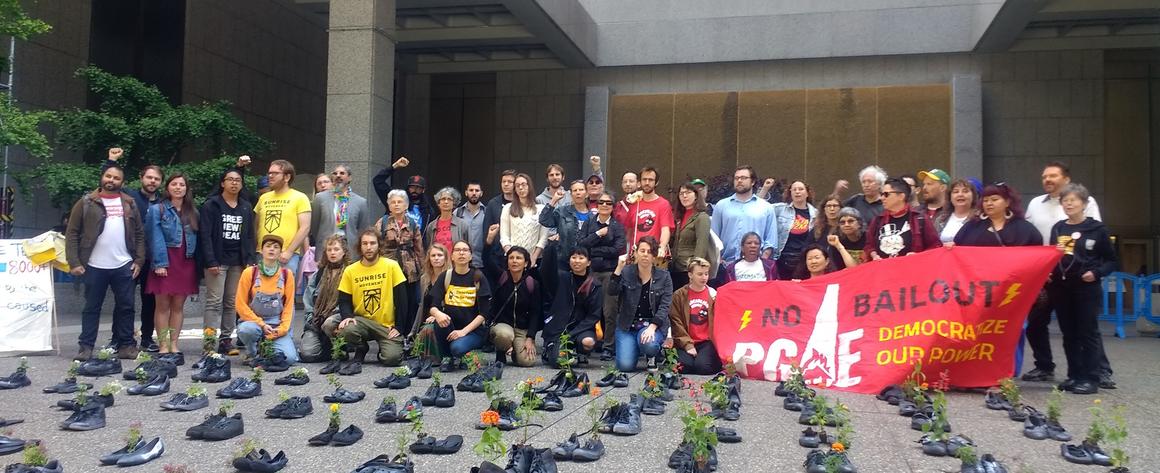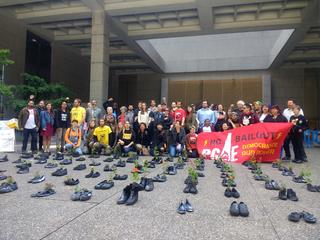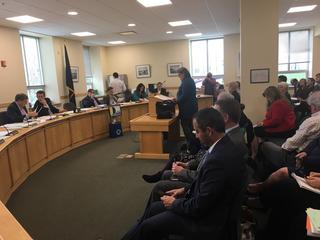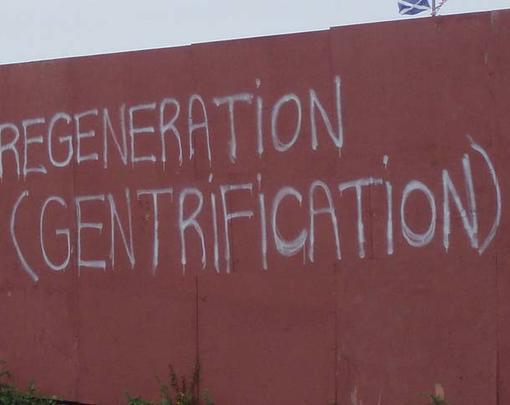The devastation wrought in recent years by preventable wildfires, targeted power shutoffs, and exorbitant rate hikes—with their hefty cost to life, health, and livelihoods—has made it clear that the for-profit model of electric utility provision has definitively failed. However, alternatives to this broken system have not only been proposed, but are gaining substantial traction. In the past few years, we’ve witnessed an eruption of support for taking back public control over electric utilities from absentee investors. With the public in charge, we can provide cheaper services—across the board, publicly owned utilities provide lower rates than investor-owned ones—and push for renewable energy to address the economic, environmental, and racial justice issues that are necessarily intertwined with how we meet our energy needs.
But wresting control of our utilities from powerful corporate interests is not easy, and the community organizations and elected officials pushing for these changes have pursued a variety of strategies not only to change the narrative around public ownership—long denigrated and vilified by profit-hungry private interests—but to win the concrete, systemic changes we need to have an economy that serves our communities. Here, we highlight some of the wins, losses, and ongoing fights for public control of power that are playing out across the country at the city and state level.
Disasters Spark Public Ownership Campaigns
California
After decades of outlandish corporate compensation, disinvestment in critical infrastructure leading to the deadliest fire in the state’s history, dangerous power cuts to tens of thousands of Californians, and two publicly funded bailouts, the people of California are asking: Who is really served by Pacific Gas & Electric (PG&E), the state’s for-profit, investor-owned energy provider? Within the last year, activists, community groups, and elected representatives have won increasing public attention and support for buying out PG&E and turning it into a publicly owned and operated service.
In California, the Oakland-based Local Clean Energy Alliance (LCEA), a member of the “No PG&E Bailout!” coalition, has been behind much of the movement for public control of electric utilities, and has linked up with other groups to demand action by Governor Gavin Newsom. The Democratic Socialists of America launched their “Let’s Own PG&E” campaign, and the LCEA’s Utility Justice Campaign has staged multiple, highly-visible protests. These community efforts have been backed up by elected officials, who have started advocating for structural changes to the way electricity is provided to their constituents. Despite the July 2019 passage of Assembly Bill 1054, which mandates a state fund to pay for the damages wrought by failing utilities, the law has so far not saved PG&E from increasing public scrutiny and pushes for more accountability: In late December 2019, Governor Gavin Newsom decried PG&E’s proposed reorganization plan as entirely inadequate.
In this year’s legislative session, State Senator Scott Weiner will advocate for Senate Bill 378, which puts public ownership of PG&E on the table. Representative Ro Khanna has become increasingly public in his calls for the company’s replacement. In addition, San Jose Mayor Sam Liccardo led a coalition of 22 California mayors—which has since ballooned to over 100 elected officials—in demanding that PG&E be ditched in favor of a customer-owned cooperative utility provider. Even former PG&E executives say that the plan is feasible.
New York City
In the midst of a dangerous heat wave in July 2019, New York’s private electricity provider Consolidated Edison (ConEd) decided to cut power to some of Brooklyn’s most marginalized communities. Between equipment failures and preemptive shut-downs, tens of thousands of New Yorkers were deprived of life-sustaining energy. The fact that the planned shutdowns disproportionately affected communities of color in Brooklyn is a clear example of the intersection of environmental, economic, and racial justice in how the private interests of absentee shareholders are served by exploiting our most vulnerable communities.
However, ConEd’s track record of offloading environmental degradation and costs onto low-income communities of color is nothing new, with the latest disasters simply provoking impetus for renewed public vetting. Community organizations such as the New York Energy Democracy Alliance and the Democratic Socialists of America have largely been behind assembling the Public Power campaign and building coalitions with a slew of outraged city council members. The campaign demands public ownership of electric utilities to order to support a commitment to renewable energy and fair usage rates. New York City Mayor Bill de Blasio has suggested a public takeover of ConEd, and Governor Andrew Cuomo warned that the company’s monopoly could easily be scrapped.
This push at the city level is in many ways supported at the state level, as well: New York State already has a publicly owned electric utility—the New York Power Authority—which community groups are pressuring to commit to concrete goals of 100% renewable energy, as well as expand its territory to be able to take over investor-owned utilities like ConEd.
The Search for Alternatives
Chicago
The Chicago City Council has also been making moves to transition the city’s electric utility to public ownership. The city’s contract with Commonwealth Edison (ComEd), a for-profit corporation that exercises a virtual monopoly over electricity provision, is up for renegotiation at the end of 2020, providing a window for restructuring the way energy is provided. In July 2019, 22 city aldermen introduced legislation that mandates a committee to investigate the feasibility of a public takeover of ComEd. The aldermen cite that it’s an opportunity to “fundamentally renegotiate the future of its utility services and energy policy.”
What’s the opposition to ComEd? Look no further than the federal investigation currently probing the utility provider’s role in buying government contracts and agreements for rate increases. Political corruption and collusion with the for-profit company, along with the soaring profits and incomes of corporate executives and absentee investors, have come at the expense of ratepayers, who are now fighting back.
The city council order was spearheaded by councilman Daniel La Spata, a member of the Chicago branch of the Democratic Socialists of America, along with other democratic socialist members. They’ve advanced municipalization as a way to quickly decarbonize the city’s energy as well as implement a progressive rate structure for low-income residents. The recent explosion of democratic socialists on the city council is the result of social movements and long-term community organizing efforts that promote the public good over private interests. And they may have a major win on the horizon: The city council’s Environmental Protection and Energy Committee agreed to conduct a feasibility study for municipal ownership, which should be completed in early 2020.
Significant Victories
Colorado
In late 2019, the city of Boulder, Colorado had a major win in its campaign to municipalize its electric utility, which is currently operated by the private company Xcel. Residents—largely organizing with the coalition Empower Our Future—have been engaged in a years-long struggle to decarbonize, decentralize, and democratize their energy provision. In October 2019, the state’s Public Utility Commission ruled that some of the company’s assets be transferred to city ownership, ending a four-year dispute over the possibility and contested legality of municipalization. The ruling, which allows for the city’s acquisition of some of the private company’s assets, is a substantial step towards the creation of a public utility, which is expected to be put to a final ballot question in the 2021 elections. It’s clear that even in years-long fights against corporate giants, these campaigns can win with broad-based support—driven in this case by widespread public determination to achieve 100% renewable energy.
In Pueblo, a small city about 100 miles south of Denver, a grassroots campaign for public power has achieved gradual, promising victories in pushing for a public electric utility. After rallies and signature-gathering drives, the campaign, called Bring Power Home 2020, has pushed the city council to hold a plebiscite on whether to ditch the city’s current investor-owned energy provider—Black Hills Energy—in a special ballot measure in May. On February 3, the city council is expected to vote in favor of holding the referendum. The campaign cites the private utility’s high electric bills, putting the interests of shareholders before those of ratepayers, and regressive rate designs that discourage energy-saving investments as reasons for seeking public ownership of the utility. In early January 2020, Susan Perkins—an energy justice advocate and member of the community group Pueblo’s Energy Future—was appointed as a member of the Colorado Public Utility Commission, potentially paving the way for continued regulatory action in favor of municipalization.
Maine
In Maine, major efforts to transfer ownership and control of the two major private utilities to the public have been met with bipartisan support, with a bill introduced in the state legislature in early 2019, LD 1646, that would allow a buyout of the private companies. The lawmakers have cited high rates, unacceptable customer service, and nonrenewable energy sources as reasons to transition to public ownership. Grassroots organizations, too, such as CMP Ratepayers Unite, have been demanding that lawmakers push for public ownership. Part of the suspicion of the private providers is due to their extractive business model: Despite being banned from cutting off power during cold weather, Central Maine Power (CMP)—one of the two major private providers—continued to deprive residents of electricity over billing disputes. In the midst of winter, dozens of Maine ratepayers demanded state regulators to push out CMP and replace it with a more transparent and accountable provider.
Fighting Back Against Privatization
Jacksonville
On Christmas Eve of 2019, the city of Jacksonville, Florida—which already had a publicly owned electric utility—successfully fought off the attempt to privatize the longstanding municipally owned utility services. The board of JEA—the publicly owned energy provider—rejected nine bids to privatize the services in a resounding rejection of the for-profit investor-owned model in favor of continued public ownership, and increased transparency and accountability.
Learning from Losses
Decorah, Iowa
The 8,000-strong community of Decorah, Iowa had an instructive loss in their campaign to take public control over their investor-owned utility. In May 2018, the grassroots organization Decorah Power encouraged residents to vote in favor of establishing an investigatory committee to explore a municipally owned electric utility. Against a hundred-thousand-dollar campaign rolled out by Alliant Energy, the for-profit provider, the grassroots initiative failed by only three votes. However, Alliant has lost to energetic grassroots organizing before: In 2013, rural residents in Minnesota established the Southern Minnesota Energy Cooperative—an alliance of twelve cooperatives—by buying out Alliant and providing publicly owned power to tens of thousands of customers. Given the near-win, the fight is far from over.
Minneapolis
Although efforts to municipalize electric utilities in Minneapolis ultimately lost, the city still gained ground in the fight to hold energy providers more accountable for their role in addressing climate change. In a familiar trend, the city saw an opportunity in 2014 to change the terms of the exclusive franchise agreement with its two private energy providers, which was up for renegotiation at the end of the year. Amidst a challenging and lengthy push for the city to consider a municipally owned utility, the group behind the effort, Minneapolis Energy Options (MEO), also recognized the renegotiation as an opportunity to hold the providers accountable, even if they couldn’t be replaced with a publicly owned utility.
In late 2014, after a long grassroots campaign to have voters and lawmakers rethink the responsibilities of energy providers, the two private utilities—CenterPoint Energy and Xcel Energy—agreed to a new franchise agreement with the city that required renewable energy commitments, a major win in the city’s attempts to meet its ambitious clean energy goals.
Campaigns to Watch
El Paso Electric
El Paso Electric, a publicly owned provider that serves customers in Texas and New Mexico, has been under threat of privatization by JP Morgan Chase in a legally questionable acquisition through an affiliate. A consultant for the city has advised the Public Utility Commission to reject the deal unless strict provisions are adhered to in order to protect the public interest, and the watchdog group Public Citizen has also criticized the deal. Despite these warnings, the privatization agreement made headway in early January, though the deal still needs to pass through further public hearings. As the fight over the future of El Paso Electric continues, it’s critical to monitor how elusive these for-profit corporations can be, which the new grassroots campaigns that are emerging will be sure to do.
New England
Other campaigns for publicly owned electric utilities are building momentum across the country. In Providence, Rhode Island, organizers have won reductions in costs for low-income ratepayers, and DSA members are continuing their Power to the People campaign to push for public ownership of National Grid, the U.K.-based multinational provider. They’ve also teamed up with the George Wiley Center, an advocacy group for low-income Rhode Islanders, which has decades of experience fighting for utility justice. In Boston, the DSA has started working with the nonprofit environmental justice group GreenRoots to push for reform and, eventually, public ownership of utilities in the fight for racial and environmental justice.
Conclusion
Given the particularly-American denigration of public ownership, it is worth emphasizing—as The Democracy Collaborative’s own Thomas Hanna has argued—that public ownership is as American as apple pie. Virtually all of the power provided in Nebraska is publicly owned, and presidential candidate Bernie Sanders has made public ownership of utilities a key part of his ambitious Green New Deal platform. What’s more, the five utilities that have already achieved 100% renewable energy are either publicly or cooperatively owned—including Burlington, Vermont, which has had municipally owned electric utilities for over a century.
Yet the movement to seize our power from the vice grip of private interests is not a singularly American phenomenon. Like the neoliberal surge that spawned widespread privatizations in the late 20th century, the drive towards public ownership of electric utilities today is similarly a worldwide phenomenon. In the past few years, the cost of for-profit private ownership on human life—especially on marginalized communities—has become too staggering to ignore. Communities around the world are organizing, and, increasingly, elected officials are listening: It’s time for public control of our power.






